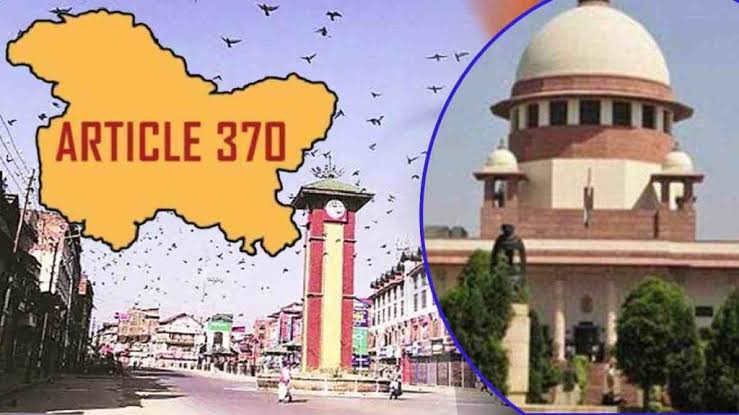
The Supreme Court of India is hearing the petitions challenging the abrogation of Articles 35A and 370 for the fourth day on Wednesday.
Challenging the abrogation at the hands of the central Government on August 05, 2019, more than twenty petitions have been filed in the Apex Court of India.
A Five-judge Constitution bench of the Supreme Court led by CJI DY Chandrachud is hearing the petitions challenging the abrogation of Article 370 of the Constitution.
After having delayed the hearing of petitions for several months, the court in July agreed to hear the case on day to day basis.
Senior Advocate and Parliamentarian, Kapil Sibal representing the Jammu Kashmir National Conference, on the first three days, challenged the August 05 decision arguing that over the years, Article 370, that granted a special status to Jammu Kashmir, had gained a permanent status after 1956 when the constituent assembly was dissolved.
The senior lawyer closed his argument stating that there was no Constitutional provision to defend the GoI unilateral action of August 05.
On Wednesday morning, senior Advocate Gopal Subramaniam has begun his arguments.
The central Government has told the court to not fiddle with Article 370 and undo the August 05, 2019 decision as it may harm the “national interest.”
Former legislators and people of Jammu Kashmir in general have pinned their hopes at the court hearings. The Live broadcast that is run on several YouTube channels is witnessing unprecedented viewership.
Here are the live updates from the Supreme Court
1130 AM: Subramaniam: There is an interesting part of the article. IIT says that “notwithstanding” the Constitution. That was necessary as there could be exceptions and modifications to provisions of the Constitution especially for J-K.
He continues
Can that be abrogated by reference to 370(1)? 370(1) was a means to communicate, was to respect each other. But that order does not contain a power to abrogate a legal compact.
This arrangement between J-K and India was a compact of federalism. Federalism is a different kind of social contract. 370 establishes the contours of this relationship in the federal sense.
People of Jammu Kashmir wanted to frame their constitution but requested the GOI that its constitution will be exceptions which they need for J&K must be brought into effect under Art 370. We have three constitutional orders regarding this- one of 1950, 1952, and 1954.
The Government of India has accepted the request and issued the 1954 Order.
Jammu Kashmir also had seperate provisions including the autonomy in respect of framing of laws. This is the way two constituent assemblies as a product of their energies through now the Constitution speak to each other.
Even though the word temporary appears in marginal notes, the resolution was that Constitution of India must apply with these modifications.
But more importantly, Article 1 and 370 must continue. I am talking of an affirmative resolution. It’s not non formalistic.
1255 P.M: The two Constitutions speak to each other through the virtue of Article 370. It was not a repository of untrammeled power, but a medium through the Indian Constitution would apply. Here lies what I call dual obligation. The dual obligation is to be discovered in the words of S 147 of J-K Constitution and second are words in Art 370 itself. In S 147, one law which couldn’t be touched was the provisions of Constitution of India as applied to J-K.
2:00 P.M: The bench gathers again post lunch. Sr Adv Gopal Subramaniam resumed his arguments.
Subramaniam: The implications of the abrogation of 1954 order is completely serious and irreversible.
2: 31 P.M: Section 10 refers to the Constitution of India. “The permanent residents of the State shall have all the rights guaranteed to them under the Constitution of India,” argues Subramaniam and this is why the wholesale abrogation of the 1954 order which is the indication of asymmetric federalism, constitutionally recognised under 370, cannot be abrogated.
2:37 P.M: “All the provisions of the Constitution as amended shall apply to the State of J&K”- this militates against the principle of exceptions and modifications which would be bilaterally urged. This emasculates bilateralism inbuilt in (1).
2:40 P.M: Subaramanium continues: If you see the new clause (d)- “Constituent Assembly should read legislative assembly of the State”. Is this interpretation? Is this exception permissible in a clause of interpretation?
2:41 P:M This is a direct amendment to Art 370(3). And that amendment cannot be achieved by an interpretation provision. This is insofar as CO 272 is concerned.
“This is a direct amendment to Art 370(3). And that amendment cannot be achieved by an interpretation provision. This is insofar as CO 272 is concerned,” says Subramaniam.
2:43 AM: CJI asks: you’re saying that what is done by CO 272 is to directly amending Art 370(3) and this couldn’t be done by amendment of an interpretative provision. What if they had done by an adaptation order?
2:44 P.M: CO 273 is a clear order under (3).
3:50 P.M: Kashmiri Lawyer, Zaffar Ahmed Shah starts arguing on the petition from Bar Council.
3:55 P.M:




